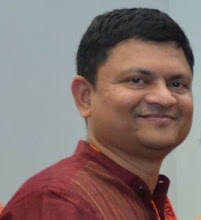If you [are] a real seeker after truth, [you must,] at least once in your life doubt, as far as possible, all things.
-Rene Descartes (1596 - 1650)
I recently met a few people who used to doubt the existence of God and then turned to Him. I have also met people who used to believe in God (or at least believe in the belief in God) and then started doubting it. It is often these issues around which debates on doubts revolve. Thankfully not many doubt the scientific methodology though they do doubt its being able to grasp all truths. Quoting Godel's logic to extend to non-formal systems, the reachability of truth is put beyond not just logic, but also thought.
The ancient Indian cosmology, as opposed to most other western religious cosmologies (for instance the ones that claim that the universe, or the earth is 6000 years old) was aware of the vastness of space and time and had become aware that to understand the hierarchy is a rather daunting task. They decided that until telescopes are invented we better turn to nuclear physics. As a result, they turned their attention inward and discovered the vastness inside. It should be possible to gaze at the truth by getting closer to zero than to infinity, they concluded.
The Greek philosophers (and then western in general) shot down the sometimes imaginative but often more holistic stuff of older philosophies replacing it with hard logic that is slow in moving outward (as also inward). But, combined with other branches of the sometimes stuttering, sometimes rocked by fraud, science, it does make definite progress throwing out everything that is not really needed. Scientists are often like horses tied to a cart, with their eyes seeing only what is in front of them. But if there are enough of them, one ends up covering all directions.
Descartes belonged to the rationalist school (in fact he was one of the founders) as against the empiricist school that included philosophers like Hobbes whose thoughts, to an extent, paralleled Indian philosophy. It is Descartes' Cogito ergo sum (I think therefore I am) that tells us if we do really exist (or rather how do we know we do exist).
The confusion often is about the purpose of life. Why do we exist? Or even, why do we need to exist? THAT is what sends people scampering off in search for truth, or Truth, or even truths. This generally gets entangled with Right and Wrong (ethics, morality and all that) too. Along that path people doubt many things, including the reality of it all. Descartes would have been partially proud. Unfortunately, they do not heed him to the T. They forget that they should also doubt that there has to be a, some, definite truth. May be there isn't any.
If you are a real seeker, you must, at least once in your life doubt, as far as possible, that a specific truth or purposefulness can be ascribed to the universe. The creativity that will then flow will really be your own.
Monday, February 04, 2008
Subscribe to:
Post Comments (Atom)




No comments:
Post a Comment